Sustainability and resilience courses the leadership and service of UH Mānoa faculty, staff, and students committed to enhancing the University’s mission of excellence.
The 2018 Awards ceremony was held on Friday, April 27, at 4 p.m. at Kennedy Theatre.
You can also see photos of the honorees on our Flickr page.
- Board of Regents’ Medal for Excellence in Teaching
- Board of Regents’ Medal for Excellence in Research
- Frances Davis Award for Excellence in Undergraduate Teaching
- Frances Davis Award for Excellence in Undergraduate Teaching for a Graduate Assistant
- Robert W. Clopton Award for Distinguished Community Service
- Chancellor’s Citation for Meritorious Teaching
- Chancellor’s Award for Outstanding Service
- Faculty Diversity Enhancement Award
- Peter V. Garrod Distinguished Graduate Mentoring Award
- Outstanding Academic Advisor / Advising Unit Award
- Student Excellence in Research (Master’s and Doctoral)
- Student Employee of the Year Award
UH Mānoa faculty and staff have also received other awards for their achievements.
Board of Regents Medal for Excellence in Teaching
The Regents’ Medal for Excellence in Teaching is awarded by the Board of Regents as tribute to faculty members who exhibit an extraordinary level of subject mastery and scholarship, teaching effectiveness and creativity and personal values that benefit students.
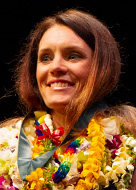 Stephanie M. Buelow
Stephanie M. Buelow
Stephanie Buelow is a professor of the Institute for Teacher Education in the College of Education. She views her role as a critical literacy teacher educator to model how literacy can empower citizens in a democratic society. Her deep commitment to cohorts working in field-based courses creates many hours outside regular teaching duties to build and maintain strong partnerships with administrators and teachers in the community. It involves close work with each teacher candidate in lesson planning, observation of them teaching in the field, planning and facilitating seminars and arranging for guest speakers to infuse the learning with place-based and cultural-based experiences to support the candidates in a sense of place unique to Hawaiʻi. One colleague states Buelow is “an emerging literacy scholar whose teaching informs her scholarship and her research informs her teaching, and her service commitments close the circle.”
 Dee-Ann L. Carpenter
Dee-Ann L. Carpenter
Dee-Ann Carpenter is an assistant professor at the John A. Burns School of Medicine (JABSOM). At the core of her teaching philosophy is a commitment to generate self-directed critical thinkers. One student dubbed Carpenter the “Swiss Army knife” physician because of her flexibility in being able to masterfully serve distinctively diverse individuals and communities with an enormous range of health concerns from chronic disease to mental health, and then to influence medical students to want to learn what is required to follow that path. Her colleagues speak extensively to the scope of her influence within JABSOM, including her contributions to such programs as the ‘Imi Ho‘ōla Post-Baccalaureate Program, Native Hawaiian Center of Excellence and the Certificate of Distinction in Native Hawaiian Health. In every setting, Carpenter is considered to be a brilliant clinician who is masterful in relating to patients and teaching learners to navigate the complexities and intricacies of medical diagnosis and treatment.
 Carolyn M. Constantin
Carolyn M. Constantin
Carolyn Constantin is a professor from the School of Nursing and Dental Hygiene. Her core elements of teaching and learning are comprised of their reciprocal nature; the effectiveness of hands-on experience and the significance of relationships in teaching and learning. These elements are present whether Constantin is leading teams of national and international professionals in nursing education or teaching her fields of research in genetics, genomics and pathophysiology at Mānoa. Her presence is described by colleagues and students as passionate, inspiring, engaging, energetic, humorous and interesting. Constantin diversifies learning activities to reach a wide range of learners and expanded her repertoire of teaching practices and formats from classroom to online by earning a graduate level certificate in Online Learning and Teaching in the Learning and Design Technology Department.
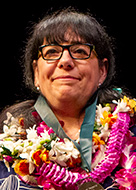 Marta González-Lloret
Marta González-Lloret
Marta González-Lloret has been a professor of Spanish in the Department of Languages and Literatures of Europe and the Americas for 20 years. She is considered one of the college’s most interdisciplinary faculty members, having taught at all levels of language, culture, reading, linguistics, technology and teaching pedagogy. She is a principal contributor in developing the parameters and protocol for assessment of undergraduate Spanish programs. A colleague reports that few others have had as much impact on the preparation of current and future language educators and that González-Lloret is the department’s pioneer and top expert in language teaching and technology. One life-changing opportunity in her courses are telecollaborative projects with other universities distant from Hawaiʻi. At the end of their journey, many students credit González-Lloret with having enlarged and transformed the trajectory of their academic journeys and accomplishments.
 Kristin J.B. Pauker
Kristin J.B. Pauker
Kristin Pauker is an associate professor in the Department of Psychology in the College of Social Sciences. In all her teaching endeavors, she infuses a commitment to diversity. This is articulated with respect to underrepresented students and through an expanded spectrum of course content and of pedagogical practices. One first generation, underrepresented, financial-needs Mānoa student describes the brilliance in Pauker’s structuring of a semester’s course as modeled on how research would be conducted. The undergraduate student found that “Professor Pauker and her graduate students treated me as a collaborator, making me confident in starting my own research project.” This rigorous, research-based commitment to teaching and learning emanates from a teacher described by her colleagues having an “easy going style,” who makes a concerted effort to learn her students’ names in classes, and who monitors each student’s success after each exam with an individual email to those struggling.
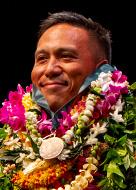 Ty P. Tengan
Ty P. Tengan
Ty “Kawika” Tengan is an associate professor in both ethnic studies and anthropology in the College of Social Sciences. A‘o aku, a‘o mai (teach, learn) is the philosophical grounding and organizing principle of his teaching practice. A colleague credits the success of the College’s Nā Ko‘oko‘o Native Hawaiian leadership program to Tengan’s a‘o approach. He inspired undergraduates, non-traditional students, and high school students to become collaborative, responsible, steadfast leaders while striving for their own academic success. Another colleague characterizes Tengan’s teaching practices as incorporating anthropological holism, critical thinking, self-reflection, experiential learning, engagement/advocacy, and qualitative research methods woven together throughout all his courses. Students speak of being “humbled that a well-respected Hawaiian leader and scholar does not entitle himself but rolls up his sleeves and gets into the work with all his haumana, leading by example.” Said one of his students, “It is Professor Tengan’s steadfast belief that “the a‘o of our land and our ancestors, both present and past, holds the key for true educational transformation.”
Board of Regents Medal for Excellence in Research
The Regents’ Medal for Excellence in Research is awarded by the Board of Regents in recognition of scholarly contributions that expand the boundaries of knowledge and enrich the lives of students and the community.
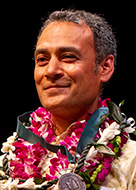 Samir K. Khanal
Samir K. Khanal
Samir Khanal is an associate professor in the Department of Molecular Biosciences and Bioengineering in the College of Tropical Agriculture and Human Resources (CTAHR). Khanal is a leading researcher in the field of anaerobic digestion, bioenergy, waste-to-resources and environmental biotechnology. He has published more than 90 papers in high quality international journals. In addition, he published the book, Anaerobic Biotechnology for Bioenergy Production: Principles and Applications, which was a best seller in 2008. He also recently published a bioenergy textbook, Bioenergy: Principles and Applications. He has supervised 13 PhD, 17 masters, 17 undergraduate and 12 high school students, 13 postdocs and 14 visiting scholars. Khanal is an associate editor of Bioresource Technology. He was a recipient of the CTAHR Dean’s Award for Excellence in Research in 2016.
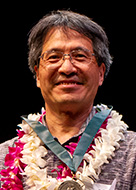 Bo Qiu
Bo Qiu
Bo Qiu is a professor in the Department of Oceanography in the School of Ocean and Earth Science and Technology. His scientific interests include large-scale ocean circulation variability, midlatitude air-sea interaction, geophysical fluid dynamics and satellite oceanography. He has published more than 120 articles in peer-reviewed journals and was a contributing author to both Intergovernmental Panel on Climate Change 4th and 5th Assessment Reports. Qiu was a recipient of the Okada Prize from the Oceanographic Society of Japan, as well as the New Investigators Award from NASA’s Mission to Planet Earth Program. He currently serves as a member of various organizations including the U.S. Argo Implementation Panel, the International Climate and Ocean: Variability, Predictability and Change’s Northwest Pacific Ocean Circulation and Climate Experiment Program Science Steering Committee, the Pacific Asian Marginal Seas Program Science Steering Committee and the Tropical Pacific Observing System 2020 Western Pacific Task Team.
Frances Davis Award for Excellence in Undergraduate Teaching
The Frances Davis Award for Excellence in Undergraduate Teaching for a faculty and a graduate assistant recognizes dedication and demonstrated excellence as teachers of undergraduate students. It was established as a memorial to the late Frances Davis, who taught mathematics at Leeward Community College and UH Mānoa for 19 years.
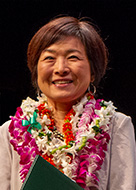 Emi Murayama
Emi Murayama
Emi Murayama is an instructor in the Department of East Asian Languages and Literature in the College of Languages, Linguistics & Literature. She sees the classroom as a dynamic space for collaboration in which students are contributors, teachers are learners, and learning is ongoing. Murayama’s research focuses on business environments, and the practices are easily adaptable to other environments. In this respect, it has had an important impact on the development of the new curriculum in Japanese, in which teaching pragmatics is a key element. Her colleagues praise her impact on the curriculum as an experienced teacher with an exceptionally wide range of courses. She is a main contributor of unique and innovative new textbooks for the curriculum, which will impact Japanese programs at other universities beyond UH Mānoa. Students credit Murayama for their academic success because she generates in them a transformation from passive to becoming active, inquisitive, engaged learners.
Frances Davis Award for Excellence in Undergraduate Teaching for a Graduate Assistant
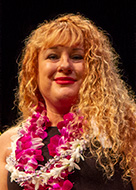 Rain Wright
Rain Wright
Rain Wright is a PhD candidate in the Department of English in the College of Languages, Linguistics & Literature. She practices her belief in writing as discovery to embolden her students to intellectual curiosity. Wright encourages students to question everything; the classroom is a space where students are inspired to respond from various points of view. She contends that students bring knowledge into the classroom through their lived experiences and stories, which expand class discussions. She finds that writing permits students to access a sense of intellectual imagination that emphasizes process-based pedagogies and the significance of re-framing preconceived notions of reading and writing. Wright makes it a practice to voice the benefits of the creative writing and reading exercises she brings to the classroom. This practice allows students to comprehend her teaching methods, further motivating them and contributing to their intellectual growth as a whole.
Robert W. Clopton Award for Distinguished Community Service
The Robert W. Clopton Award for Distinguished Community Service recognizes a UH Mānoa faculty member for playing a socially significant role by applying intellectual leadership and academic expertise to the improvement of the community. The award was established as a memorial to longtime Mānoa College of Education Professor Robert Clopton and first awarded in 1977.
 Jill S.M. Omori
Jill S.M. Omori
Jill Omori is an associate professor of family medicine and community health in the John A. Burns School of Medicine. Deeply integrated with Omori’s teaching and research at UH Mānoa is her service to the homeless, which has had a significant and profound impact upon the lives of thousands in our island communities through the Homeless Outreach and Medical Education (H.O.M.E.) project. This project demonstrates a core element to her community service from which emanates her extensive influence in the welfare of the community. H.O.M.E. patients’ comments include: “She parked the H.O.M.E. Project Van behind our tent and delivered medical care to us. She was so encouraging. Just by taking time to talk to us, she made us feel like human beings” and “Through selfless acts of kindness, Dr. Omori gave our family hope at a time when we were losing hope fast.” A student wrote, “Dr. Omori is a shining example of a compassionate and humble physician, teacher, and human being. When you are around her, you can feel her positive energy and feel inspired. If I can accomplish at least half of what she has done in my lifetime, I feel I would have done something meaningful.”
Chancellor’s Citation for Meritorious Teaching
The University of Hawaiʻi at Mānoa Chancellor’s Citation for Meritorious Teaching recognizes Mānoa faculty members who have made significant contributions to teaching and student learning.
 Henri A. Casanova
Henri A. Casanova
Henri Casanova is a professor of information and computer sciences in the College of Natural Sciences. Casanova’s course materials contain multiple pathways for students to explore both traditional and cutting-edge research through interactive in-class programming exercises, code examples inserted throughout presentations and carefully designed assignments for out-of-class problem solving. Former students describe his courses as challenging, relevant, effective and inspiring, and credit his teaching with having impacted directly and positively on the path their careers have taken. One student anticipating a future as a teacher wrote that they “aspire to teach classes like him one day.” Beyond the classroom, Casanova has developed the entire high performance computing curriculum for the department. His co-authored textbook for the graduate course in this curriculum has been adopted nationally and internationally. A colleague at another institution speaks of relying professionally on the intersection of exemplar pedagogical practice and high-quality research produced by Professor Casanova.
 Lysandra H. Cook
Lysandra H. Cook
Lysandra Cook is an associate professor of the Department of Special Education in the College of Education. A strong influence on Cook and an expression of her commitment to teaching and learning is Project Laulima, a federally-funded grant on which she has served as project director since 2012. The project involves many elements that include: collaborative development of a detailed curriculum map, integrated assessment system and 19 new course syllabi infusing collaboration and co-teaching, universal design for learning culturally relevant pedagogy and instructional technology. These courses form the new Exceptional Students and Elementary Education program recognized as one of the “25 Best Special Education Degrees for 2017” in the nation by College Choice. Students speak highly of Cook’s impact on their learning and credit her with “pushing me to be my best, at times believing in me more than I believed in myself.” Another student says “she inspires deep reflection on pedagogy and effective practices for diverse learners.”
 Priyam Das
Priyam Das
Priyam Das is an associate professor in the Department of Urban and Regional Planning in the College of Social Sciences. She is described by a student as “a remarkable instructor who exemplifies the joys of learning. She brings out the best in each student.” Her wide range of teaching practices include innovations like place-based projects that situate students in community settings. Das’ support extends beyond courses taken and dissertations written. She mentors students by working together on research, and by organizing mock job talks that invite faculty and students to participate in the feedback process to prepare graduate students for positions in academia. Colleagues commend Das for her invaluable contributions in improving the department curriculum and praise her success at inspiring students to excel through her “ability to interplay between spatial planning and social structures that gives her teaching authenticity and empowers students.”
 Richard R. Day
Richard R. Day
Richard Day is a professor of the Department of Second Language Studies in the College of Languages, Linguistics & Literature. He combines cutting-edge knowledge with an enjoyable, engaging classroom presence. Day inspires students to envision the art and science of teaching as achievable for them “rather than as a form of unreachable wizardry.” Students and colleagues express frank admiration and commendations for Day as someone “deserving of a lifetime achievement award for his brilliance as a teacher, and as a definitive professional of world renown.” One student writes “Each Tuesday and Thursday I wake up with such joy and anticipation, knowing that I am coming to SLS 303.” Day’s teaching contributions have far reaching impacts as evidenced in his graduate course developed more than 20 years ago and still available to any department today. The course is designed to develop an apprenticeship in teaching to benefit graduate students bound for academic lives.
 Randall K. Minas
Randall K. Minas
Randall Minas is an assistant professor of information technology management in the Shidler College of Business. He brings a new area of expertise to undergraduate majors: how to analyze the neurophysiological and psychophysiological responses of users of information technology. Minas has twice been awarded “Shidler Professor of the Semester” during his early semesters of teaching. Colleagues attribute the doubling in student enrollment in this major to the teaching rapport of Minas with his students. They appreciate that in a class of 40 students, Minas devises a wide-ranging set of learning assessment tools so that he can personalize his mentoring process, because “students with different personalities need different assessment techniques.” A graduate student expresses three characteristics that enable him to accomplish this and to bring out the best in students: his collaborative teaching style, his patience and his optimism.
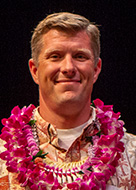 A Zachary Trimble
A Zachary Trimble
Zachary Trimble is an assistant professor of the Department of Mechanical Engineering in the College of Engineering. Through teaching practices based on the Feynman Technique, he generates discovery, nourishes passion and stimulates curiosity in students, enabling them to develop critical thinking competency. This heightens learning and strengthens confidence enabling students to take ownership of their own progress and “transition from being told what to do and how to do it, to defining their own tasks and really understanding their significance in the context of a project.” Students offer examples of how Trimble’s commitment to them precedes their entry into engineering and continues after graduation. Trimble demonstrates a passion for teaching that extends to publishing on teaching excellence and in his role as co-principal investigator in a research and training grant that brought Vertically Integrated Project educational pedagogy to UH Mānoa.
Chancellor’s Award for Outstanding Service
The University of Hawaiʻi at Mānoa Chancellor’s Award for Outstanding Service honors a Mānoa staff member who demonstrates outstanding work performance, service and leadership.
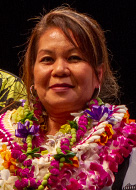 Gina M. Bagarino (Civil Service)
Gina M. Bagarino (Civil Service)
Gina Bagarino is an office assistant with the College of Tropical Agriculture and Human Resources’ Kona Cooperative Extension on Hawaiʻi Island. She has served the college for 15 years, starting as a student employee at the Kamuela Cooperative Extension Office. With her diverse work experience and amicable personality, Bagarino has become the heart and soul of the office and has proved to be a dedicated individual. “From commercial farmers bringing in soil and tissue samples to diagnose a problem on their farm, to a homeowner bringing an unknown insect or plant for identification, Gina provides the connection of our community to UHM,” said a colleague. Bagarino anticipates what needs to be done, is a great team player and tackles all assignments and issues with calm, grace and perfection.
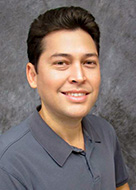 Marcus N. Hayden (APT)
Marcus N. Hayden (APT)
Marcus Hayden serves as fiscal manager in the College of Tropical Agriculture and Human Resources (CTAHR). A 13-year employee of the university, he joined CTAHR in 2016 and has encouraged growth and development amongst his staff and helped regain control of the college’s budget. His nominators agree that “his leadership style is one of calm and collective demeanor topped with patience and understanding.” Hayden provided face-to-face trainings and listened to concerns of other departments to assist them in accomplishing their research, teaching and extension goals. He created new solutions that provided more budget transparency and ensured future stability for the college. “With eagerness to teach and nurture those around him, Marcus’s legacy will resonate throughout the years here at CTAHR,” say his colleagues.
 Jameson Ramelb (Buildings and Grounds)
Jameson Ramelb (Buildings and Grounds)
Jameson Ramelb is a landscape manager for Buildings and Grounds Management. During his four years with the department, Ramelb has made significant improvements to the UH Mānoa campus and motivates staff to take on projects they can be proud of. Colleagues applaud his dedication to remedy potential environmental issues surrounding the university and neighboring communities. Under his leadership, the department saved an additional $30,000 by working on a large sidewalk project at lower campus which otherwise would have been contracted out. When several areas on campus flooded due to ineffective drainage, he researched different ways to meet storm drain compliance and was successful in eliminating flooding flash points. Ramelb collaborates and assists with the campus arboretum including a large planting project on McCarthy Mall that greatly enhanced that part of the campus.
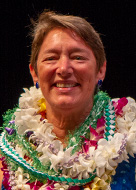 Valerie J. Yontz (Faculty Specialist)
Valerie J. Yontz (Faculty Specialist)
Valerie Yontz is a specialist and practicum coordinator with the Office of Public Health Studies (OPHS) in the School of Social Work. A 23-year employee of the university, she has been in her current position for 11 years. She is credited for her “exceptional contributions to the achievement of the department’s program objectives and success.” Among her many achievements, Yontz played a key role in securing re-accreditation for the program in 2007 and 2014, she developed strong campus-community partnerships for services, continuing education and research, and is a champion for student career development and academic advising. For 10 years as the chair of Department Curriculum Committee, she has guided the development of courses and expansion of the OPHS academic program.
Dr. Amefil “Amy” Agbayani Faculty Diversity Enhancement Award
The Faculty Diversity Enhancement Award from the UH Mānoa Commission on Inclusion and Diversity recognizes a faculty member who has demonstrated an ongoing commitment to enhancing diversity.
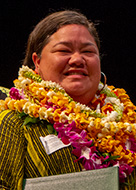 Erin Kahunawaikaʻala Wright
Erin Kahunawaikaʻala Wright
Erin Kahunawaikaʻala Wright is an assistant professor in educational administration in the College of Education, and a proud alumna of the University of Hawaiʻi at Mānoa. Her deep understanding of student affairs combined with her presence and scholarship as a Native Hawaiian faculty member inspires Native Hawaiian, local and other students to aspire to earn terminal degrees. Wright has authored multiple publications and serves on various committees including her role as research committee co-chair for the Indigenous Peoples Knowledge Community for NASPA (National Association of Student Personnel Administrators), a leading professional organization for student affairs in higher education. She is also a member of various campus committees, such as ʻĀinahou and the chancellor’s Ka Hoʻokō Kuleana Native Hawaiian Place of Learning Working Group. As the inaugural director of Native Hawaiian Student Services in the Hawaiʻinuiākea School of Hawaiian Knowledge, she helped acquire $8 million in extramural funding to support Native Hawaiian students and higher education professionals at UH Mānoa.
Peter V. Garrod Distinguished Graduate Mentoring Award
Established by the University of Hawai‘i at Mānoa Graduate Division in 2005, the Distinguished Graduate Mentoring Award allows graduate students to nominate faculty for excellent mentoring, one of the foundations of outstanding graduate education.
 Tamara B. Ticktin
Tamara B. Ticktin
Tamara Ticktin is a professor in the Department of Botany in the College of Natural Sciences. Over the past 17 years, she has had the privilege of mentoring and learning from a large and diverse lab of graduate students from Hawaiʻi and across the globe. Her mentoring philosophy involves setting high expectations for her students and providing strong support and guidance to help them meet her expectations. She is committed to enhancing diversity and has placed special emphasis on doing so in her lab. Ticktin’s students have been highly successful—most have received prestigious fellowships and grants and/or awards for their research presentations and publications and have ultimately succeeded in their career paths.
Outstanding Academic Advisor and Academic Unit of the Year Award
The Council of Academic Advisors recognizes an individual or unit who, over the past two years, has demonstrated excellence and/or innovation in advising, and/or has made a significant contribution to the advising community.
 Pakela Award
Pakela Award
Ernest “Niki” Libarios Jr. was the director of the College of Education Office of Student Academic Services (OSAS). As an academic advisor, he worked tirelessly to support underrepresented students in higher education, securing multiple grants to provide scholarships, host campus visits and waive test fees. Libarios also established a “culture of collaboration” and partnership between OSAS and other offices on campus, which led to joint workshops and recruitment initiatives. He coordinated with STEM (Science, Technology, Engineering and Math) departments to encourage more students in STEM fields to consider a career in education. He advocated for Filipino students and was the primary catalyst for the College of Education’s Tinalak: The Filipino Education Advisory Council, established to recruit and support Filipinos in the education profession. More broadly, he was one of the creative forces behind the “Be a hero. Be a teacher.” campaign, a statewide push to get more students interested in and excited about educating the next generation. Most recently, Niki collaborated with the Department of Education and the legislature on the “Grow Our Own” initiative, securing significant scholarship funding for post-baccalaureate students to pursue a certificate in secondary education. However, for all his accomplishments in education, Niki will probably best be remembered simply for his smile, positive attitude and compassion. He was a valued colleague who is missed by all who knew and worked with him.
 ‘Oikela Award
‘Oikela Award
Since its creation in 2008, the Mānoa Advising Center (MAC) has been assisting students in selecting a major that best fits their interests, abilities and goals. MAC’s advisors — Matt Eng, assistant specialist; Eve Millett, junior specialist; Andrew Nguyen, junior specialist; Winnie Tang, junior specialist (former); Megan Terawaki, junior specialist; and Director Megumi Makino-Kanehiro — work with these exploratory students by meeting with them regularly in mandatory advising appointments and providing the opportunity for greater exploration through advisor-created and -taught courses. Other courses offered by MAC advisors provide training for the Mānoa Peer Advisor Program, co-founded in 2010 by Makino-Kanehiro to provide students with resourceful peer advisors who service advising offices and students across the UH Mānoa campus. MAC advisors are also responsible for overseeing the Mānoa Sophomore Experience, a program created to engage and retain sophomores and second-semester students. In addition to serving exploratory students, the advisors have made scholarly contributions to the field of academic advising, regularly presenting at local, regional, national and international conferences and holding leadership positions in the National Academic Advising Association. As one colleague summed it up, they are “great partners and collaborators.”
Student Excellence in Research Award
The Student Excellence in Research Award is awarded by the Office of the Vice Chancellor for Research in recognition of outstanding scholarly research endeavors by students while they pursue a degree at the doctoral, master’s or bachelor’s level.
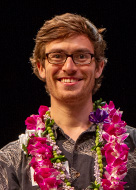 Samuel Grunblatt
Samuel Grunblatt
Samuel Grunblatt joined UH Mānoa in 2013 to obtain a PhD in astronomy. Grunblatt studies exoplanets (planets outside our solar system) orbiting distant red giant stars, which are future versions of our Sun. Combining data from the NASA K2 Mission, world-class telescopes on Maunakea and novel analysis techniques, Grunblatt has discovered two new planets orbiting such stars, shedding new light on the mechanism responsible for the formation of these exotic systems. He has led multiple first-author publications and presented his research in talks at major international conferences including NASA’s Ames Research Center. His results have been highlighted in popular media. Grunblatt is also passionate about outreach and has encouraged local high school students to literally aim for the stars and search for new planets orbiting the solar system.
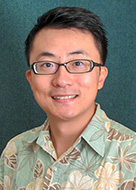 Zhibin Liang
Zhibin Liang
Zhibin (Ben) Liang is pursuing his doctorate in the Department of Molecular Biosciences and Bioengineering in the College of Tropical Agriculture and Human Resources (CTAHR). He is passionate about neurosciences and conducts innovative and rigorous investigations on Alzheimer’s drug discovery. Liang has been using novel biomedical technologies in his dissertation research, resulting in the development of new glycogen synthase kinase-3β (GSK3β) inhibitors as promising neuroprotective agents for Alzheimer’s treatment. In the past two years, he has published three lead-authored and two co-authored papers on his research in peer-reviewed journals. His scientific accomplishments have been well recognized. He won the four best research awards at the 2016 and 2017 CTAHR Student Research Symposia. He received the 2016 American Chemical Society Division of Biological Chemistry Travel Award and the 2017 American Society of Pharmacognosy the Lynn Brady Travel Award. Liang was the awardee of the 2017 Alzheimer’s Drug Discovery Foundation Young Investigator Scholarship. He hopes that his scientific contributions will one day help fight Alzheimer’s disease.
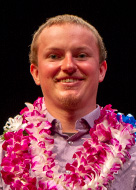 Nathaniel Wehr
Nathaniel Wehr
Nathaniel Wehr is pursuing a master of science in the Department of Natural Resources and Environmental Management (NREM) in the College of Tropical Agriculture and Human Resources. His thesis research examines the ecological relationship between feral pigs and soil microbial and macroinvertebrate communities, relationships that have been largely undescribed and represent important knowledge gaps in the management of invasive species, as well as public health in the Pacific Islands. This work earned him the Watson T. Yoshimoto Fellowship in the Ecology, Evolution and Conservation Biology Graduate Specialization. Outside of his thesis research, Wehr works cooperatively on research projects examining the population dynamics of the endangered Hawaiian stilt. He is the treasurer for the Society for Conservation Biology, Hawaiʻi Chapter and the grant and awards representative for the NREM Graduate Student Organization. Wehr intends to pursue a PhD in wildlife ecology, with the ultimate goal of entering academia to continue his passions of teaching and conducting research.
Student Employee of the Year Award
The Student Employee of the Year Program was created in 1986 by the Mānoa Career Center to recognize and highlight the achievements and contributions of student employees on the UH Mānoa campus.

Kuaiwi Laka Kahiwakapu Pili I Haupapanui Makua
This senior majoring in kinesiology and rehabilitation science works as a Native Hawaiian Student Services Scholar Center assistant. Kuaiwi Laka Kahiwakapu Pili I Haupapanui Makua effectively utilizes the concepts she is actively learning in her classes, the experiences she has had as a student employee and in her volunteer work and the values she developed in her home and family life to create accessible lessons through which she can teach others. These are perfect examples of what student employment can do for a college student.
